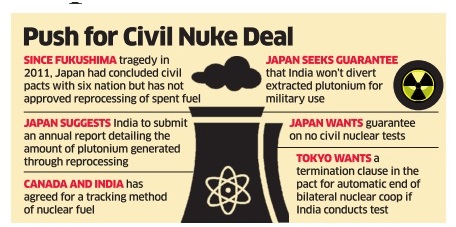Background:
- India not being a signatory to the Nuclear Non-Proliferation Treaty (NPT) is one of the sticking points in indo –japan civil nuclear dal. India has been insisting that its non-proliferation record is impeccable enough to warrant an agreement, but Japan wants India to honour its promise — to impose a ban on further nuclear tests — made in the run-up to the waiver the Nuclear Suppliers Group (NSG) granted it for doing trade in atomic energy.
- For the energy-starved India, an agreement with Japan is important because Japanese companies have a virtual monopoly over the supply of reactor vessels, a critical component of civil nuclear plants. Without an agreement between the two countries, these firms cannot supply to French and American companies that have won orders to install nuclear plants in India.
- At present, India does not have enough commercial uranium enrichment capacity to produce its own low enriched fuel in sufficient quantities for its Pressurised Light Water Reactors(PWRs). So it is dependent on imported fuel for its PWRs. India is therefore planning to increase its uranium enrichment capability.
Now, the news:

- In a significant development that could have positive bearing on proposed Indo-Japan civil nuclear deal, Tokyo is likely to change its policy to allow reprocessing of spent nuclear fuel from Japanese-made reactors.
- Tokyo for the first time has approved reprocessing of nuclear fuel by a country using Japanese-made reactors.
- Since the 2011 Fukushima tragedy , Japan had concluded civil pacts with six countries including Jordan, Russia, Turkey and Vietnam, but has not approved reprocessing of spent fuel generated by Japanese-made nuclear reactors.
- Indo-Japan civil nuclear deal has remained elusive despite several rounds of negotiations since 2010 .
- Japan has been consistent on its po sition on India’s non-NPT status and tougher safeguards on reprocessing of spent fuel supplied to Indian reactors.
- Indian considers NPT as discriminatory and has signed nuclear deals with NPT signatories like USA, Canada and Australia.
AffairsCloud Recommends Oliveboard Mock Test
AffairsCloud Ebook - Support Us to Grow
Govt Jobs by Category
Bank Jobs Notification

